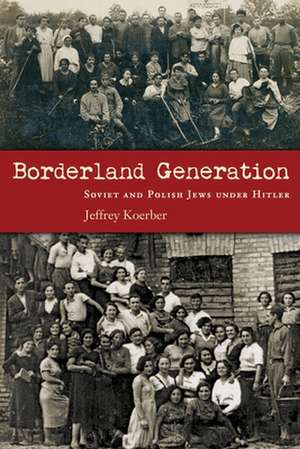Koerber, J: Borderland Generation
en Limba Engleză Hardback – dec 2019
Set in two cities flanking the border, Grodno in the interwar Polish Republic and Vitebsk in the Soviet Union, Borderland Generation traces the prewar and wartime experiences of young adult Jews raised under distinct political and social systems. Each cohort harnessed the knowledge and skills attained during their formative years to seek survival during the Holocaust through narrow windows of chance.
Antisemitism in Polish Grodno encouraged Jewish adolescents to seek the support of their peers in youth groups. Across the border to the east, the Soviet system offered young Vitebsk Jews opportunities for advancement not possible in Poland, but only if they integrated into the predominantly Slavic society. These backgrounds shaped responses during the Holocaust. Grodno Jews deported to concentration camps acted in continuity with prewar social behaviors by forming bonds with other prisoners. Young survivors among Vitebsk's Jews often looked to survive by posing under false identities as Belarusians, Russians, or Tatars. Tapping archival resources in six languages, Borderland Generation offers an original and groundbreaking exploration of the ways in which young Polish and Soviet Jews fought for survival and the complex impulses that shaped their varying methods.
Preț: 486.71 lei
Preț vechi: 632.09 lei
-23% Nou
Puncte Express: 730
Preț estimativ în valută:
93.16€ • 101.23$ • 78.31£
93.16€ • 101.23$ • 78.31£
Carte tipărită la comandă
Livrare economică 21 aprilie-05 mai
Preluare comenzi: 021 569.72.76
Specificații
ISBN-13: 9780815636199
ISBN-10: 0815636199
Pagini: 440
Dimensiuni: 157 x 235 x 30 mm
Greutate: 0.86 kg
Editura: Syracuse University
ISBN-10: 0815636199
Pagini: 440
Dimensiuni: 157 x 235 x 30 mm
Greutate: 0.86 kg
Editura: Syracuse University
Notă biografică
Jeffrey Koerber is assistant professor of history at Chapman University in California
Descriere
Traces the prewar and wartime experiences of young adult Jews raised under distinct political and social systems. Each cohort harnessed the knowledge and skills attained during their formative years to seek survival during the Holocaust through narrow windows of chance.
